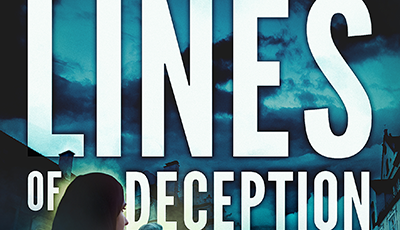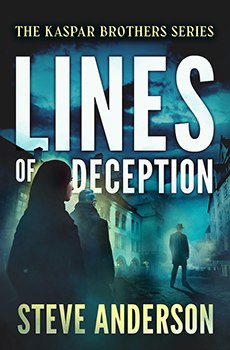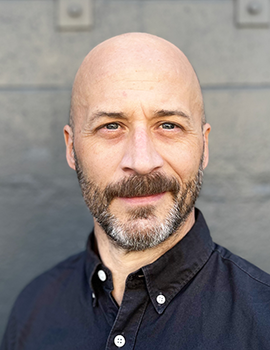

Historical Thrillers LINES OF DECEPTION with Steve Anderson
The Big Thrill Discusses LINES OF DECEPTION with Steve Anderson
 A West German nightclub owner goes behind the Iron Curtain on a desperate mission to save his brother, in this Cold War thriller by the author of Lost Kin.
A West German nightclub owner goes behind the Iron Curtain on a desperate mission to save his brother, in this Cold War thriller by the author of Lost Kin.
West Germany, 1949. Former actor Max Kaspar suffered greatly in the Second World War. Now he owns a nightclub in Munich—and occasionally lends a hand to the newly formed CIA. Meanwhile, his brother Harry has ventured beyond the Iron Curtain to rescue an American scientist. When Harry is also taken captive, Max resolves to locate his brother at all costs. The last thing he expects is for Harry to go rogue.
Max’s treacherous quest takes him to Vienna and Prague to Soviet East Germany and Communist Poland. Along the way, dangerous operators from Harry’s past join the pursuit: his former lover Katarina, who’s working for the Israelis, and former Nazi Hartmut Dietz, now an agent of East German intelligence. But can anyone be trusted? Even the American scientist Stanley Samaras may not be the hero Harry had believed him to be . . .

Steve Anderson
Steve Anderson recently sat down with The Big Thrill to discuss his latest historical thriller, LINES OF DECEPTION.
Can you pinpoint a moment or incident that sparked the idea for this book?
Periods and settings in turmoil are fertile ground. I’m always drawn to characters who are stuck between two worlds and in over their heads with a plan that’s doomed to fail, but they stick with it anyway. They often don’t know exactly what they’re doing, but they believe in making the effort. That is the main character in all my books, really — the outsiders and the underdogs. It’s especially so for this book. My main character, Max Kaspar, has survived a lot and overcome a suspect past. But he has to risk it all to save the one person who had saved him — his brother Harry. So the incident was simply, What if Harry went missing and Max had to find him? How far would Max go? He ventures solo beyond the Iron Curtain in 1949, as it turns out.
When you first created your protagonist for this book, did you see an empty space in crime lit that you wanted to fill? What can you share about the inspiration for that character?
This book is the fourth in a series but it’s also a standalone. Max Kaspar, and the other two protagonists, his brother Harry as well as the assassin Katharina Buchholz, are definitely the types who make their own path, as I allude to above. They are products of their era but also want to right the wrongs of their era, in their own ways. Even if that means getting in over their heads. I didn’t specifically set out to fill an empty space in crime lit, but at the same time I don’t know of any characters quite like these. They buck trends and flout conformity. And they care.
A novel is such a major undertaking; there’s the writing of it, of course, then you’re spending months and months revising, polishing, and then promoting it. How did you know this was the book you wanted to spend the next couple of years on?
What’s that saying? You don’t choose the story, it chooses you? That was definitely the case here. Once I had the incident above, I was hooked and had to find time to work on it, before the day job, after, weekends, whenever. Then I let it sit and rewrote it again. Luckily my agent found a new publisher for the series, which helped get it to publication.
Were there any particular books, movies, or songs that were knocking around in your head while you were writing this one?
Movies and books from or set in the late 40s were definitely in my mind. The Third Man is by Graham Greene is the obvious one, given the storyline. I was also thinking of books by John Le Carre and Alan Furst among others, but at the same time — I purposely don’t read too close to my story when I’m writing it, so as not to be unduly influenced!
In addition to a great read, what do you hope readers will take away from this story?
That any pursuit, however moral or noble, still produces some grim truths. You have to lose something to gain something. Not all readers want to know that power can corrupt even the good or that the bad have their reasons. Or that the accepted lines might just include the big lie. Hopefully readers appreciate learning weird bits of history or local color on the journey.
What can you share about what you’re working on next?
I’m working on the third book in my Wendell Lett series, which is also a standalone. It’s too early to say much about, but it takes my main character, a disturbed WWII combat vet and former deserter who’s also uniquely capable, to go undercover to help discover a Soviet mole on a secret project in the Pacific Northwest, about 1950. I’m also working on something completely different: A coming-of-age soccer novel set in the wild days of the North American Soccer League of the late 1970s.
Steve Anderson is the author of numerous novels, mostly historical thrillers about gutsy underdogs. In an earlier life he earned an MA in history and was a Fulbright Fellow in Germany. Day jobs have included busy waiter, Associated Press rookie, and language instructor. He’s also written historical nonfiction and translated bestselling German novels. A hopeless soccer addict, he lives in his hometown of Portland, Oregon with his wife René.
To learn more about the author, please visit his website.
LINES OF DECEPTION with STEVE ANDERSON
- LAST GIRL MISSING with K.L. Murphy - July 25, 2024
- CHILD OF DUST with Yigal Zur - July 25, 2024
- THE RAVENWOOD CONSPIRACY with Michael Siverling - July 19, 2024
